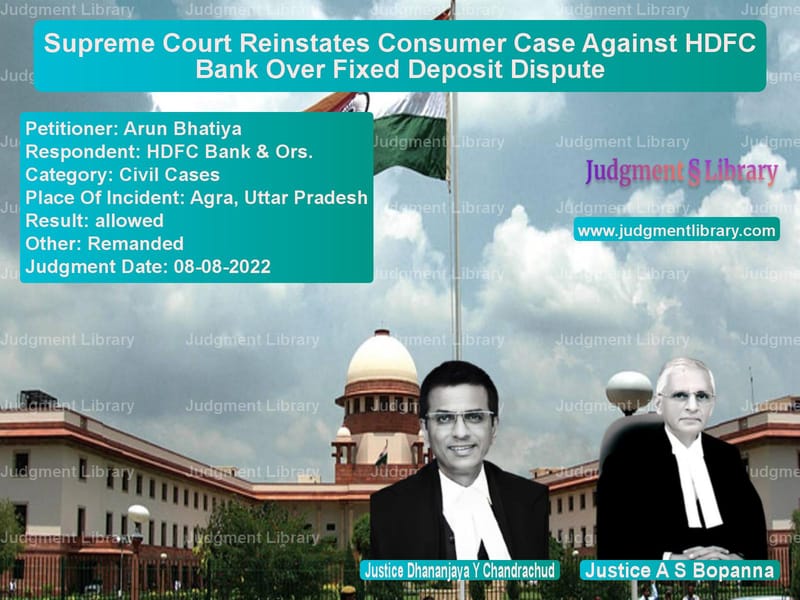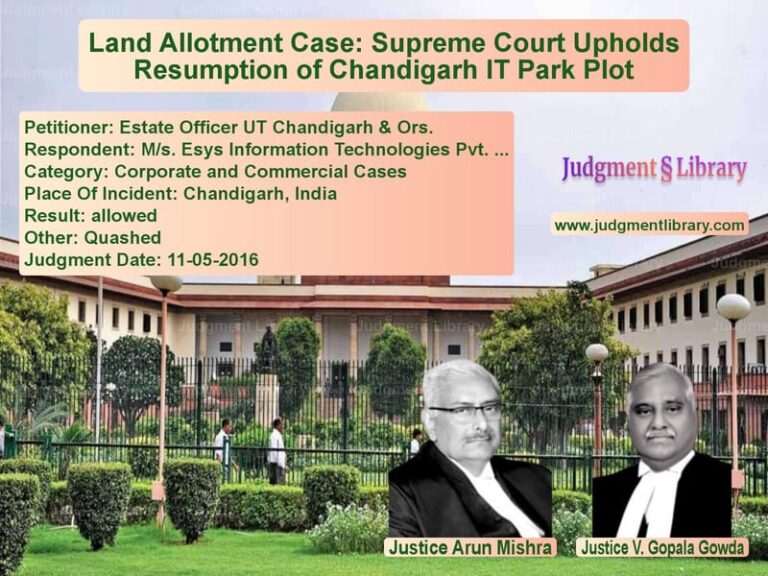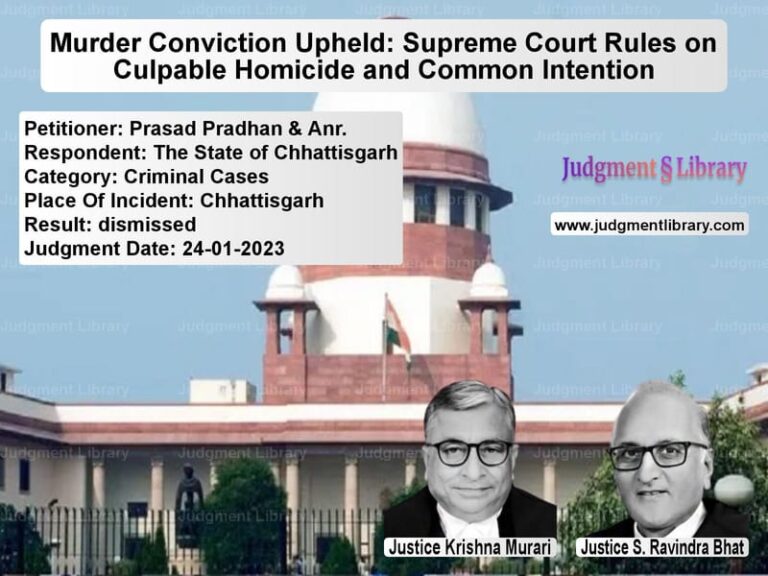Supreme Court Reinstates Consumer Case Against HDFC Bank Over Fixed Deposit Dispute
The Supreme Court has reinstated a consumer complaint against HDFC Bank, reversing the decisions of the National Consumer Disputes Redressal Commission (NCDRC) and the State Consumer Disputes Redressal Commission (SCDRC). The dispute arose over the premature encashment of a joint fixed deposit (FD), which the complainant alleged was done in violation of banking norms and without his consent.
Background of the Case
The complainant, Arun Bhatiya, had opened a joint fixed deposit account of ₹75 lakhs with his father at HDFC Bank’s Agra branch. The FD was set to mature on May 31, 2016, with an interest rate of 7.5% per annum, making the maturity value ₹77 lakhs.
According to the complainant, on May 31, 2016, both he and his father issued a written instruction to the bank to renew the FD for another 10 days in the same joint mode. However, on June 2, 2016, the father allegedly submitted a letter to the bank’s Adajan Branch in Surat, requesting the encashment of the entire FD amount into his individual savings account.
The complainant contended that he was unaware of this transaction and, on June 3, 2016, sent an email instructing the bank not to transfer the FD proceeds to any single-holder account. However, by June 4, 2016, the bank had already credited the entire FD amount to the father’s individual account.
Feeling aggrieved by this unilateral transaction, the complainant filed a consumer complaint before the SCDRC, alleging deficiency of service and unauthorized fund transfer.
Proceedings Before Consumer Forums
SCDRC’s Decision
- The SCDRC dismissed the complaint on October 24, 2018, ruling that the dispute was primarily a family matter between the complainant and his father.
- It held that the issue did not constitute a consumer dispute and redirected the complainant to pursue civil litigation.
NCDRC’s Orders
- The complainant appealed to the NCDRC, which on May 7, 2019, dismissed the appeal as withdrawn with liberty to approach an appropriate forum.
- Subsequently, the complainant filed a review application, claiming that he had not instructed his counsel to withdraw the appeal. The NCDRC rejected the review on July 25, 2019.
Arguments Before the Supreme Court
Petitioner’s Arguments (Arun Bhatiya)
- The petitioner argued that he never authorized the encashment of the FD into his father’s individual account.
- He contended that the bank’s action amounted to a deficiency in service under Section 2(1)(g) of the Consumer Protection Act, 1986.
- He submitted that the withdrawal of his NCDRC appeal was not voluntary and that his previous counsel misrepresented his instructions.
- He asserted that his complaint was valid as the FD terms mandated joint authorization for any encashment.
Respondent’s Arguments (HDFC Bank)
- The bank argued that the father, as a joint account holder, had the authority to request the encashment.
- It stated that the amount was transferred based on the father’s signed instructions, which were received before the complainant’s request to stop the transaction.
- The bank maintained that the transaction was processed in good faith and as per its standard operating procedures.
Supreme Court’s Observations
The Supreme Court found merit in the petitioner’s claim that the dispute involved a potential deficiency of service by the bank. The Court noted:
“The complaint filed by the petitioner is not merely a father-son dispute but raises a fundamental issue of whether the bank followed due process before permitting the encashment of a jointly held fixed deposit.”
It further emphasized:
“Consumer protection laws exist to ensure that financial institutions adhere to fair banking practices. The unilateral encashment of a joint FD raises concerns that merit a full inquiry.”
The Court also criticized the NCDRC for dismissing the review without properly evaluating the petitioner’s claims about his lawyer’s misrepresentation.
Supreme Court’s Verdict
The Supreme Court ruled in favor of the complainant and passed the following orders:
- The orders of the NCDRC dated May 7, 2019, and July 25, 2019, are set aside.
- The consumer appeal is restored before the NCDRC for a full hearing on its merits.
- The bank may file additional affidavits in its defense within four weeks.
- The NCDRC is directed to dispose of the case within four months.
Impact of the Judgment
This ruling has significant implications for consumer banking rights:
- It reaffirms that financial institutions must adhere to strict guidelines when handling joint accounts.
- It strengthens consumer rights by allowing complaints related to banking transactions to be adjudicated under consumer protection laws.
- It ensures that consumer forums do not dismiss cases prematurely, particularly when procedural irregularities are involved.
The judgment underscores the Supreme Court’s commitment to upholding banking ethics and consumer rights, providing relief to customers facing unauthorized financial transactions.
Petitioner Name: Arun Bhatiya.Respondent Name: HDFC Bank & Ors..Judgment By: Justice Dhananjaya Y Chandrachud, Justice A S Bopanna.Place Of Incident: Agra, Uttar Pradesh.Judgment Date: 08-08-2022.
Don’t miss out on the full details! Download the complete judgment in PDF format below and gain valuable insights instantly!
Download Judgment: arun-bhatiya-vs-hdfc-bank-&-ors.-supreme-court-of-india-judgment-dated-08-08-2022.pdf
Directly Download Judgment: Directly download this Judgment
See all petitions in Consumer Rights
See all petitions in Banking Regulations
See all petitions in Judgment by Dhananjaya Y Chandrachud
See all petitions in Judgment by A. S. Bopanna
See all petitions in allowed
See all petitions in Remanded
See all petitions in supreme court of India judgments August 2022
See all petitions in 2022 judgments
See all posts in Civil Cases Category
See all allowed petitions in Civil Cases Category
See all Dismissed petitions in Civil Cases Category
See all partially allowed petitions in Civil Cases Category







